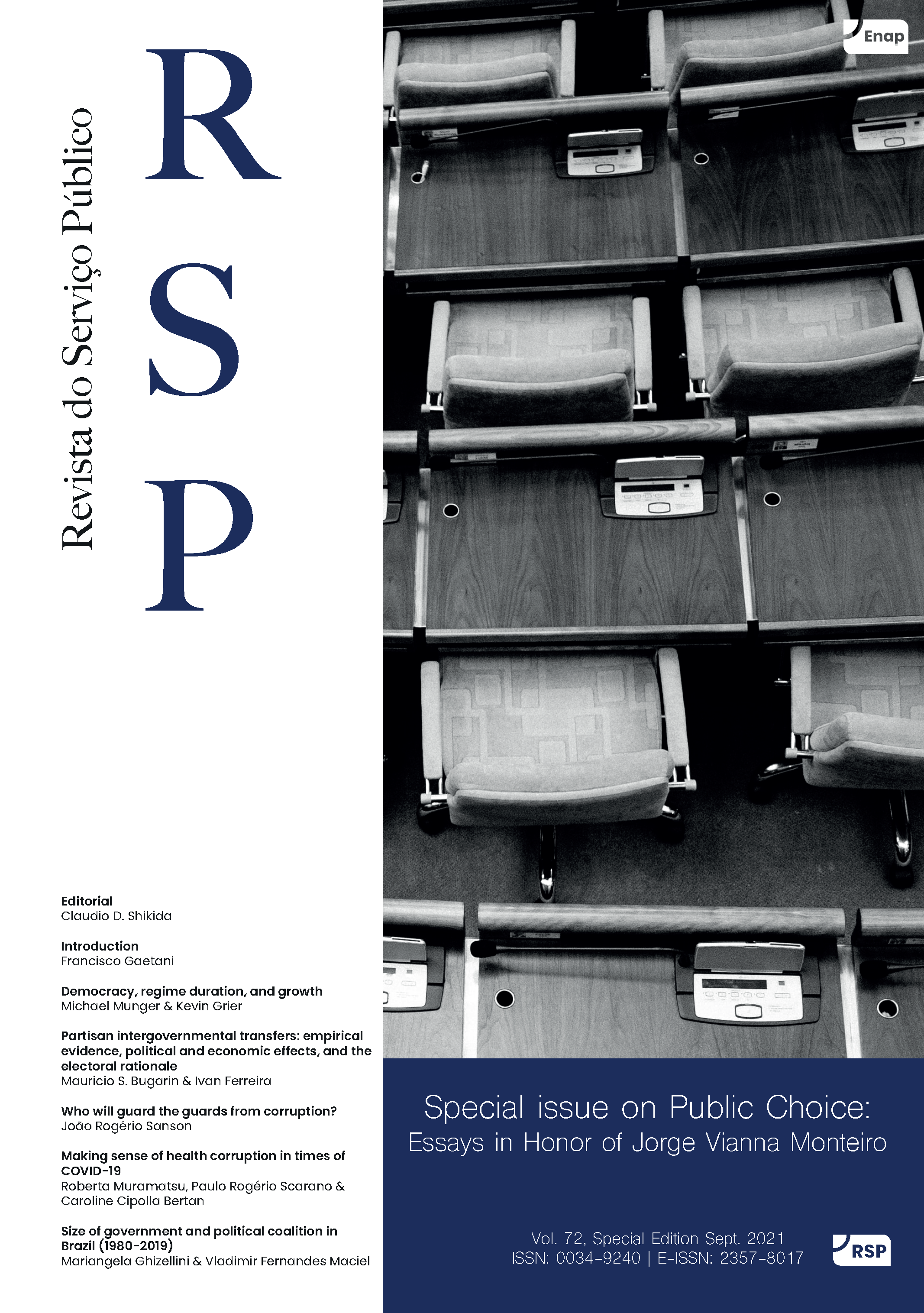Democracy, regime duration, and growth
Keywords:
economic development, autocracyAbstract
Findings of regularities in statistical relationships between regime type and economic growth are debatable, because specifications are variable. We argue that the effect of regime type on growth is contingent on the duration of the regime. Further, the effect of duration depends on regime type: older autocracies grow at a different rate than older democracies. The reason is that the causes for decelerating growth are fundamentally different in democracies and autocracies. Our estimations are run on a large (unbalanced) annual panel of 155 countries from 1950 – 2006. In this sample, autocracies grew around 0.75 percentage points more slowly than non-autocracies, holding constant the regime-specific effect of regime duration. Autocratic growth rises for the first 30 years, after which growth rates fall rapidly. Non-autocracies always grow faster than equally old autocracies, but the differences are especially pronounced when young and old regimes are compared. Some implications of this result for the political system of Brazil are discussed.
Downloads
References
Achen, Chris. (2005). “Let’s Put Garbage-Can Regressions and Garbage-Can Probits Where They Belong.” Conflict Management and Peace Science, 22:327–339.
Alesina, Alberto, and Roberto Perotti. 1994. "The Political Economy of Growth: A Critical Survey of the Recent Literature." The World Bank Economic Review 8(3): 351-71.
Aron, Janine. (2000). “Growth and Institutions: A Review of the Evidence.” The World Bank Research Observer, vol. 15, no. 1 (February 2000), pp. 99–135.
Bhagwati, Jagdish. 1995. "Democracy and Development: New Thinking on an Old Question/' Indian Economic Review 30(1): 1-18.
Barro, Robert (1996) Democracy and Growth, Journal of Economic Growth, 1: 1-27.
Brunetti, Aymo (1997) Political Variables in Cross-Country Growth Analysis, Journal of Economic Surveys, 11: 163-190
de Haan, Jacob, and Clemens L. J. Siermann. 1995a. "A Sensitivity Analysis of the Impact of Democracy on Economic Growth." Empirical Economics 20(2): 197-215.
de Haan, Jacob, and Clemens L.J. Siermann. 1995b. "New Evidence on the Relationship between Democracy and Economic Growth." Public Choice 86(1-2): 175-98.
Gerring, John, Bond, Philip, Barndt, William, and Carola Moreno (2005) Democracy and Economic Growth: A Historical Perspective. World Politics, 57 (3): 323-345.
Groningen Growth and Development Center, online databases: http://www.ggdc.net/
Huntington, Samuel. 1968. The Political Order in Changing Societies. New Haven, CT: Yale University Press.
Kaufmann, Daniel and Aart Kraay (2002) Growth without Governance, World Bank working paper.
Kaufmann, Daniel, Aart Kraay, and Massimo Mastruzzi. 2009. "Governance Matters—VIII: Aggregate and Individual Governance Indicators, 1996-2008." World Bank Policy Research Working Paper, DECRG, No. 4978.
Knack, Stephen, and Philip Keefer. 1995. "Institutions and Economic Performance: Cross-Country Tests Using Alternative Institutional Measures." Economics and Politics 7(3): 207-27.
Kurzman, Charles, Regina Werum, and Ross E. Burkhart. 2002. "Democracy's Effect on Economic Growth: A Pooled Time Series Analysis, 1951-80." Studies in Comparative International Development 37(1): 3-33.
Leblang, David. (1997). “Political Democracy and Economic Growth: Pooled Cross-Sectional and Time-Series Analysis.” British Journal of Political Science. 27: 453-472.
Levine, Ross, and David Renelt (1992) A Sensitivity Analysis of Cross-Country Growth Regressions, American Economic Review, 82: 942-963.
McGuire, Martin, and Mancur Olson. 1996. “The Economics of Autocracy and Majority Rule: The Invisible Hand and the Use of Force.” Journal of Economic Literature.
(1): 72-93.
Maddison, Angus, Historical Statistics. Online database: http://www.ggdc.net/Maddison/
Monteiro, J.V. 2007. Como Funciona O Governo: Escolhas Públicas na Democracia Representativa. Sao Paulo, Brazil: FGV Publishers.
Monteiro, J.V. 2009. “Policy-Making in the First Lula Government.” In Brazil under Lula: Economy, Politics, and Society under the Worker-President. J. Love and W. Baer, Editors. pp 47-65.
Nelson, Joan M. 1987. "Political Participation." In Understanding Political Development: An Analytic Study, ed. Myron Weiner, Samuel Huntington, and Gabriel A. Almond. Boston: Little Brown.
Nelson, Michael A., and Ram D. Singh. 1998. "Democracy, Economic Freedom, Fiscal Policy, and Growth in LDCs: A Fresh Look." Economic Development and Cultural Change 46(4): 677-96.
North, D., & Weingast, B. (1989). Constitutions and Commitment: The Evolution of Institutions Governing Public Choice in Seventeenth-Century England. The Journal of Economic History, 49(4): 803-832.
Olson, Mancur. 1993. "Dictatorship, Democracy, and Development." American Political Science Review 87(3): 567-76.
Persson, Torsten and Guido Tabellini. (2009). Democratic Capital: The Nexus of Political and Economic Change, American Economic Journal: Macroeconomics 1(2): 88-126.
Przeworski, Adam, Alvarez, M, Cheibub J, and F. Limongi (2000) Democracy and Development: Political Institutions and Wellbeing in the World, New York: Cambridge University Press.
Pritchett, Lant. 2000. Understanding Patterns of Economic Growth: Searching for Hills among Plateaus, Mountains, and Plains. World Bank Economic Review. 14(2): 221-250.
Rodrik, Dani, Arvind Subramanian, and Francesco Trebbi. 2004. ‘Institutions rule: The primacy of institutions over geography and integration in economic development.’ Journal of Economic Growth 9 (2): 131‐165.
Ross, Michael. 2006. ‘Is democracy good for the poor?’ American Journal of Political Science 50(4): 860‐874.
Siegle, Joseph T., Michael Weinstein and Morton Halperin. 2004. ‘Why democracies excel.’ Foreign Affairs 83(5):57‐72.
Sirowy, Larry, and Alex Inkeles. 1990. "The Effects of Democracy on Economic Growth and Inequality: A Review." Studies in Comparative International Development 25(1): 126-57.
Tavares, Jose, and Romain Wacziarg (2001) How Democracy Affects Growth, European Economic Review, 45: 1341-1378.
Wintrobe, Ronald. (1998) The Political Economy of Dictatorship. New York: Cambridge University Press.
Downloads
Published
How to Cite
Issue
Section
License
Copyright (c) 2021 Revista do Serviço Público

This work is licensed under a Creative Commons Attribution-NonCommercial-ShareAlike 4.0 International License.
- A RSP adota a licença Creative Commons (CC) do tipo Atribuição – Uso Não-Comercial (BY-NC).
- A licença permite que outros remixem, adaptem e criem obra licenciada, sendo proibido o uso com fins comerciais.
- As novas obras devem fazer referência ao autor nos créditos e não podem ser usadas com fins comerciais, porém não precisam ser licenciadas sob os mesmos termos dessa licença.
- Ao publicar o artigo na RSP, o autor cede e transfere para a ENAP os direitos autorais patrimoniais referentes ao artigo.
- O artigo publicado na RSP não poderá ser divulgado em outro meio sem a devida referência à publicação de origem.
- O autor que tiver o artigo publicado na RSP deverá assinar o Termo de Concessão de Direitos Autorais (em momento oportuno a editoria da Revista entrará em contato com o autor para assinatura do Termo).



